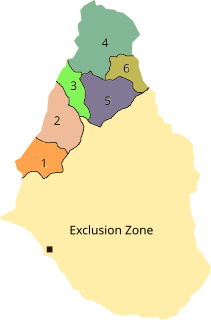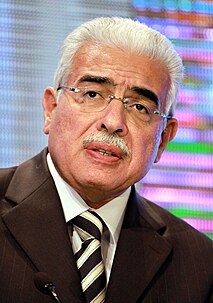Elections to determine the makeup of the legislative bodies on the three levels of administrative division in the Kingdom of Sweden are held once every four years. At the highest level, these elections determine the allocation of seats in the Riksdag, the national legislative body of Sweden. Elections to the 20 county councils (landsting) and 290 municipal assemblies (kommunfullmäktige) – all using roughly the same electoral system – are held concurrently with the legislative elections on the second Sunday in September.
Mixed-member proportional (MMP) representation is a mixed electoral system in which voters get two votes: one to decide the representative for their single-seat constituency, and one for a political party. Seats in the legislature are filled firstly by the successful constituency candidates, and secondly, by party candidates based on the percentage of nationwide or region-wide votes that each party received. The constituency representatives are elected using first-past-the-post voting (FPTP) or another plurality/majoritarian system. The nationwide or region-wide party representatives are, in most jurisdictions, drawn from published party lists, similar to party-list proportional representation. To gain a nationwide representative, parties may be required to achieve a minimum number of constituency candidates, a minimum percentage of the nationwide party vote, or both.
Norway elects its legislature on a national level. The parliament, the Storting, has 169 members elected for a four-year term by the proportional representation in multi-seat constituencies.
Parallel voting describes a mixed electoral system where voters in effect participate in two separate elections for a single chamber using different systems, and where the results in one election have little or no impact on the results of the other.
Elections in Greece gives information on elections and election results in Greece.

Elections in Benin take place within the framework of a multi-party democracy and a presidential system. Both the President and the National Assembly are directly elected by voters, with elections organised by the Autonomous National Electoral Commission (CENA).

Elections in Gabon take place within the framework of a presidential multi-party democracy with the Gabonese Democratic Party, in power since independence, as the dominant party. The President and National Assembly are directly elected, whilst the Senate is indirectly elected.

Elections in Montserrat take place within the framework of a multi-party democracy and a parliamentary system. The Legislative Assembly is directly elected, and a Chief Minister is selected by the party or coalition with the most seats in the Assembly.

Elections in Rwanda take place within the framework of a multi-party democracy and a presidential system. The President and majority of members of the Chamber of Deputies are directly elected, whilst the Senate is indirectly elected and partly appointed.

The Parliament of Egypt is currently a unicameral legislature. The Parliament is located in Cairo, Egypt's capital. Under the country's 2014 constitution, as the legislative branch of the Egyptian state the Parliament enacted laws, approved the general policy of the State, the general plan for economic and social development and the general budget of the State, supervised the work of the government, and had the power to vote to impeach the President of the Republic, or replace the government and its Prime Minister by a vote of no-confidence.

St. Helens South and Whiston is a constituency created in 2010 represented in the House of Commons of the UK Parliament by Marie Rimmer of the Labour Party.

The Egyptian parliamentary elections of 2010 first voting round was held in Egypt on 28 November 2010 and the second round was held on 5 December 2010.
Early parliamentary elections were held in Egypt on 27 October 1971, with a second round for 141 seats taking place on 3 November, following the adoption of a new constitution in September 1971. At the time the country was a one-party state and all candidates had to be members of the Arab Socialist Union (ASU). Two candidates were elected from each of the 175 constituencies, with a second round of voting required if one or both of the candidates failed to win over 50% of the vote in the first round, or neither of the candidates with over 50% were classed as a worker or farmer. In total, 1,661 candidates contested the elections.

Parliamentary elections were held in Egypt on 28 October 1976, with a second round in four constituencies on 4 November. Unlike previous elections in which the Arab Socialist Union was the sole legal party, this election saw three factions of the party compete against each other, together with 208 independents.
Early parliamentary elections were held in Egypt on 7 June 1979, with a second round for 147 seats being held on 14 June. Following the experimental 1976 elections, in which three different factions of the Arab Socialist Union had competed against each other, the country had returned to multi-party politics. This was confirmed in a referendum on the formation of new parties held in April.

Parliamentary elections were held in Iceland on 24 June 1934. They were the first held after reforms to the electoral system that increased the number of seats in the Lower House from 28 to 33 and ensured that all members of the Althing were elected at the same election. The Independence Party emerged as the largest party in the Lower House, winning 14 of the 33 seats.

Egyptian parliamentary elections to the House of Representatives were held in two phases, from 17 October to 2 December 2015. The elected parliament will be entrusted with the task of reviewing the laws that were passed while a parliament was not in session.

Parliamentary elections were scheduled to be held in Chad in November 2018, having been postponed since 2015. A new deadline of May 2019 has been proposed by the government.

Parliamentary elections were held in Seychelles from 8 to 10 September 2016. Three parties and three independent candidates ran for the 25 directly-elected seats. The result was a victory for the opposition Linyon Demokratik Seselwa alliance, which won 19 of the 33 seats. It was the first time since the 1979 elections that the People's Party did not win a majority of seats.

Parliamentary elections was held in Mauritania in September 2018; the first round took place on 1 September, with a second round held on 15 September. At the national level, elections were held in 157 constituencies, each electing one member to the National Assembly. Elections were also held in 13 regional councils and 219 municipalities.

















